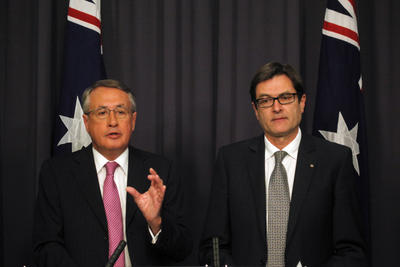For example, Australia has agreed to raise A$599 million in fast-start financing for developing countries (of which it had already allocated A$498 million by June 2011). It also contributed A$15 million to the Least Developed Countries Fund for capacity building programs in 2011, and established the A$150 million International Climate Change Adaptation Initiative (which will focus mostly on East Timor and the Pacific Islands).
But activity must not be mistaken for achievement.
In the absence of a comprehensive cross-mechanism framework, each fund coordinated under the UN umbrella adopts its own criteria for allocating adaptation assistance. The result is an inconsistent and ad hoc approach in which there is no minimum standard of equality and efficacy. As such, there is no guarantee that the money will be integrated with development processes; no certainty that corrupt politicians will not subvert its use; and no promise that it will be based upon gender-sensitive and participatory strategies.
There is no doubt that developed countries should be spending money to assist their developing partners adapt to climate change. Not only will they be hit hardest by a warming of the earth’s temperatures, but they will struggle to respond. Weak governments, lack of money and gaps in technical knowledge make these states uniquely vulnerable. But money is not the solution in and of itself.
High levels of poverty persist on the African continent, despite massive injections of aid over the decades. In large part this is due to the absence of political accountability which plagues the continent, making it difficult for money to reach the most vulnerable.
This severe lack of fiscal accountability and political transparency in countries receiving financial assistance is equally damaging to climate change-related financing initiatives. A report by Transparency International in 2011 found that where ‘huge amounts of money flow through new and untested financial markets and mechanisms’, there is a strong risk that corrupt leaders will divert such funding toward their own personal interests, undermining the success of adaptation projects.
During the latest round of climate change negotiations in Durban, Australia was quick to capitalise on its recent carbon tax success by positioning itself as a leader in the discussions. But it is now time for Australia to take the lead in developing a comprehensive cross-mechanism framework to guide the disbursement of funds at a project level.
Certainly, without adequate resources, adaptation cannot be achieved. But without guaranteeing minimum standards of quality, this money — no matter how great in quantity, or how well governed at an international level — will not translate into success in the local context.
The Australian government has a responsibility to ensure that its adaptation money is spent effectively and equitably. Domestic imperatives to do so stem from the need to maintain accountability to its taxpayers. But regionally a large number of Australia’s immediate neighbours are either low-lying island states or developing nations. Moral imperatives and the principle of common but differentiated responsibilities aside, if countries such as Tuvalu find themselves underwater or in disarray following an environmental crisis, the likely resulting conflict and exodus of refugees will have significant repercussions for Australia’s security and economy.
In the future, we need to delve beneath the numbers to consider the actual substance of adaptation assistance. By continuing to channel finance through UN mechanisms which show little regard as to how recipient countries spend this money, Australia may as well be pouring money into a black hole.
Amritha Thiyagarajan is a student at the University of New South Wales and a member of the Global Voices Australian Youth Delegation to the recent UN negotiations in Durban.


I’m glad to see a return to arguing for greater action on climate change. This week’s withdrawal by Canada from the Kyoto protocol was yet more bad news.
In China, there is beginning to be a compelling economic and political argument for tackling pollution and climate change because the problems they create are immediate, not years off: http://bit.ly/uYXa7C Let’s hope for some more progress.
Although what you said is true, there is, however, a clear and big difference between the visible part and the less visible part of emissions.
What you said is probably and largely the visible part of the problem like air quality and water quality. Those problems have largely been resolved in most developed countries.
The current issue that both Kyoto and ever since has been more focused on the less visible part of the problem: carbon dioxide that is said to cause global warming.
So, for China and many developing countries there are ‘double’ tasks, one is to deal with the visible and local part, as sometimes shown on TV reports even by developed world such as in Australia about the air population in China, and the other is for the carbon dioxide.
Arguably, the first task has more rapid and localised effect on people and countries.
It is useful to understand the differences.